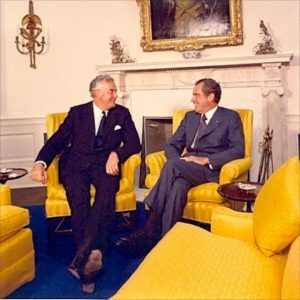Most people of a certain age have a Gough Whitlam story: here’s a couple more anecdotes from the quick quips and after-dinner range. Vale.
Gough memories: Victorian born
I knew Gough Whitlam: not well, but that is not the point of this story of which I was reminded by his recent death.
When I was on the Council of the Law Institute of Victoria, we hosted a dinner for the members and Gough Whitlam, then Prime Minister of Australia was our guest speaker.
Each council member hosted a table. My table was next to a table hosted by a charismatic council member by the name of Brian McCarthy. Now, Brian was what was known in those days as a rabid member of the Democratic Labour Party who hated the Labor party and particularly Gough Whitlam. The official table at which Gough was seated was raised above the other tables. Brian’s table was immediately in front of the official table.
Gough was introduced and got up to speak. He was a towering figure both physically and intellectually. He commenced with his deep, sonorous voice: “I was born in Victoria and at the age of three my father took me to New South Wales” at which stage, Brian chipped in by saying “Thank God!”
Everyone laughed and Gough waited for the laughter to subside…at which stage, he seemed to grow another few inches and then leaned over and looked down on Brian and merely said: “Indeed!”
I thought at the time that no one gets the better of Gough and tucked that away in my memory bank.
Some years later it fell to me to move a vote of thanks to Gough as a guest speaker for the International Commission of Jurists at the Law Institute premises in Melbourne. As usual, Gough gave a deeply-researched speech on our obligations under international treaties (which are constantly ignored by our High Court). When he had finished, and after prolonged applause, I had to give my talk in thanks to the guest speaker. I can remember it like yesterday, when I stood at the lectern; Gough was seated on my right and a little behind me. I had thought long and hard about this speech to this famous person and decided to take the risk. So I began along the following lines:
“It is customary on occasions such as this to say lots of nice things about the guest speaker but I would have to say that I have heard some terrible things about you, Mr Whitlam”
At that stage, Gough half rose from his seat and looked at me with a fierce ferocity in his eyes as though he was about to hit me. So I continued:
“Some time ago I was in the boardroom of an international merchant bank in London as a luncheon guest and we were discussing the Watergate crisis, which at that stage had not proceeded to identifying Nixon as the culprit. One of the pin-striped suited bankers started extolling the virtues of Nixon when I said: “But Nixon is just a crook”. Immediately, this pin-striped suited banker turned to me and in exquisite Oxford English accent, while pushing his thumb into my chest, replied: “I’ll tell you who’s a crook, your Whitlam; he’s a crook”.
Suddenly, the ferocity disappeared from Gough’s face and his face beamed, exclaiming:
“Has the Statute of Limitations period expired?” (This is the period that the law allows for people to sue. Once the period expires, the right to sue expires).
Everyone joined in the laughter with Gough and we went to dinner, after which he accepted our hospitality and stayed at our Melbourne apartment overnight.

Gough came to power after 23 years of conservative government which appeared to have run out of ideas and which was bereft of a vision for Australia. In three short years, Gough and his government shattered the complacency of Australians by introducing a range of dramatic changes such as universal health cover for every Australian; free university education; granting traditional owners land rights that had long been denied them; abolishing conscription and withdrawing from the Vietnam war; acknowledging the rights of women; and endowing the arts. One acquisition for which he was heavily criticised was that of “Blue Polls” by Jackson Pollock for $1.3 million (recently, the National Gallery refused an offer of $100 million).
Sadly, there are darker sides to Gough’s regime particularly in relation to Australia’s role in the Indonesian invasion of East Timor and the murdering of Australian journalists. That story has partly unfolded in an inquest held in Sydney some years ago and doubtless the full story will ultimately be told.
Having said that; I was pleased to have known Gough; pleased to have worked with some prominent Australians to overcome the entrenched left wing opposition in the Australian Labor party to reform, thus paving the way for Gough’s leadership and ultimate electoral success.
At the dinner after the International Commission of Jurists meeting, one of our sons, who was then an engineering student at Melbourne University, ended up sitting next to Gough. However, all the big shots captured Gough’s attention with the result that our son was pretty much ignored. The next morning, Gough phoned my wife and apologised for ignoring our son as he found it difficult to get time in between the constant barrage of questions and comments from the other people at the table. He assured my wife that he would like to have the opportunity on some occasion to make it up to my son. Sadly, that occasion never eventuated.
Louis A Coutts is a lawyer, management consultant, author, and academy founder amid a host of other achievements.

